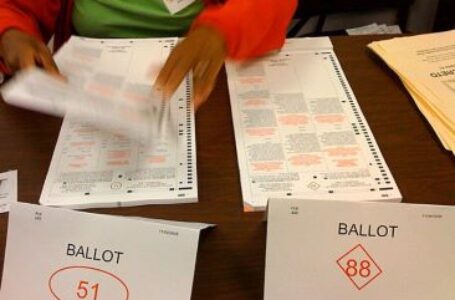The civilized life of the rural south’s ‘neanderthals’

BAKER COUNTY, FLORIDA — The biggest shock came Sunday morning at Mass. I sat in the back pew and looked around and saw something I’m not used to seeing at Mass: human faces.
Yes, every other pew was roped off. No, there wasn’t any “passing of the peace” or other handshaking or hugging. Yes, families sat as far from other families as possible, which forced a small overflow crowd into the “cry rooms” at the back of the church. Yes, there was much hand sanitizer. Heck, there was even a touchless holy water dispenser.
But still, there were actual faces. I would guess 120 people attended Mass, and only six of them wore masks. The last time I saw actual faces at Mass was March 13, 2020, the final day my own parish had Mass before a three-month closure. From June 2020 until last week, every Mass I attended in four states, two countries, and maybe 10 parishes, was about 100% masked.
So, it felt liberating to be unmasked and be able to see unmasked faces. A baby two pews up stared at me. I smiled big. The baby smiled back. It was awesome.
Afterward, the pastor bumped fists with the regulars and the visitors, and then folks retired to the parish hall for coffee hour, also unmasked.
After-Mass hospitality is the sort of thing that transforms a church into a central hub of community. Churches are an indispensable community institution, especially for middle-class rural places such as Baker County. Rural places without functioning church communities often have nothing to take their place, and the result is dropouts, a collapse of family, and deaths of despair.
My home parish in the D.C. area has a new pastor who barely knows any of us since he doesn’t really know what we look like and because we haven’t had a parish social event since a fish fry in February 2020.
The contrast between my life in D.C.’s suburbs and what I witnessed of life in Baker County was extreme. Back near the Beltway, we wear masks at all stores, we wear masks inside restaurants, except when eating or drinking, and most of our restaurants and bars are closed anyway, except for the patios. There’s very little handshaking, and on the mostly empty sidewalks of D.C. and mostly empty wooded paths of Montgomery County, people nevertheless wear masks and try to stay at least 12 feet away.
If not quite uneasy, I felt naked in Baker County. I felt like I was getting away with something. I stopped into Tractor Supply Co., in part because I need two fuel hoses for one piece of my outdoor power equipment (and living in a Democratic town, I am very far from a Tractor Supply at home), and in part to see what the distancing and masking behavior was like in a national chain here. Over the summer, in the rural South, I found that local bait shops were maskless, but CVS, Wal-Mart, et cetera were masked.
My findings last week: Florida is not a great place to shop for snowblower parts, and nobody in the Baker County Tractor Supply wore a mask.
So, is Baker County living like “neanderthals,” as President Biden said of Texans eschewing masks?
Biden’s comment was not the sort of thing one says when trying to persuade. It was either Biden losing his temper or Biden playing culture-war disdain politics to please his college-educated “OH MY GOD I LOVE SCIENCE SO MUCH” base.
Disdain is part of why so many people in Texas and Baker County don’t wear masks. They are sick of condescending nanny-staters telling them how to live, in part because condescending nanny-staters from the media and the federal government also don’t want them owning the guns they own, driving the cars they drive, and clinging to the Bibles they cling to.
But also, nobody likes having to wear a mask.
Mask-wearing is good during this pandemic since the virus spreads through exhalations by infected people, including some infected people who don’t realize they’re infected. Indoor mask-wearing also seems to me like a small sacrifice, made out of care for one’s neighbor, that likely makes at least some noticeable dent in the spread of the virus.
Maskless Baker County, though, isn’t short on love of neighbor, I’ve found. “It’s a tight-knit community,” Scott, one father coming out of Mass Sunday morning, told me. That means that people who might be sick are more likely to stay home, because they know all the people they might be infecting. It also means you know who’s brother or husband was sick, and so it’s easier to know who to stay away from. Plus, you know who already got it or who got vaccinated, so it’s easier to know whom you don’t have to stay away from.
I heard the “tight-knit” explanation for Baker County’s COVID-looseness from at least three locals.
What about folks who might not have a choice? I asked all the bartenders and waitresses I met in Baker County if they felt unsafe working indoors in such an unmasked environment. None of them did.
“I mean, they tell you to put it on,” one bartender, Janet, told me, “but I’m like, ‘I can’t breathe in it.’ If I’m gonna get it, I’m gonna get it. If it happens, it happens. It is what it is.”
One bartender explained, “I don’t see my mother because she’s in a nursing home.” She said if she were taking care of her mother, she would wear a mask.
The public schools are all open throughout almost all of Florida but offering remote options.
“Best of both worlds,” said Crystal, a bartender whose daughter is spending her senior year of high school in person while her son is doing sophomore year remotely. “My daughter is more social than my son is. He actually likes it. He gets to play video games after he does his work. He got bored like I did in school.”
“He’s got plenty of friends,” she added, “They’re just all on the headphones.”
Also, I find Baker County is very attuned to the economic and social costs of lockdowns. Crystal works three jobs. All of them are waitressing and bartending. When Florida locked down in March, she lost all three paychecks. “I was out of work for like two months.”
She got relief checks at the time. “But when you got two teenagers who are remote schooling and home all day every day, it doesn’t go very far.”
One bar owner learned I was from the D.C. area and shook his head: “I don’t know how you guys do it up there. A lot of businesses up there gotta be walking dead.”
When this bar owner had to close down in the spring, he found that the neighbors all lined up for to-go service immediately, to help keep his business afloat. When he reopened, he required masks and found “some asshats” refused to wear them. Most folks went along with it.
Now every restaurant and bar here is operating at 100% capacity.
So how has this maskless county fared amid the pandemic? About the same as the rest of the country.
Baker County has averaged three cases daily over the past two weeks, according to New York Times data, and has reported exactly one case in the past four days. They haven’t had a day with 10 new cases since Feb. 11, and they haven’t reported a COVID-19 death in March. Given a population of nearly 28,000, their average of 13 cases per 100,000 is not stellar, but it’s less than half New York City’s rate and steadily falling.
New York City’s positivity is 7.26% and falling, while Baker County’s has been below 5% every day in March and below 4% most days for the past two weeks.
Remember that eschewing the masks and shaking hands isn’t a new thing in Baker County. This is how they’ve been living at least since Florida’s summer surge ended, and yet cases are falling here just as surely as they’re falling in more masked and distanced places such as Washington, D.C., and New York. Cases are falling from a lower peak and currently at a lower level.
Other parts of Florida are less open than the rural parts. In Jacksonville, for instance, many bars and restaurants voluntarily limit capacity, and almost everyone follows the indoor mask requirement at the hotels. (In Baker County, most people didn’t bother, and no staff enforced the rules.) Still, Florida has been more open than other states, and it is about at the middle of the pack on most measures of COVID spread — which is remarkable, considering how elderly the state is. It’s generally doing better than California and New York, in part by focusing on protecting nursing homes.
So is this “neanderthal” behavior? It’s hard to agree with Biden here, considering that the neanderthals died out, while a senior citizen in Florida is less likely to die of coronavirus than a senior in California or New York.
And seeing people’s smiles, dining out with one’s neighbors, and gathering for coffee on Sunday afternoon — these things make life down here seem downright civilized.

















